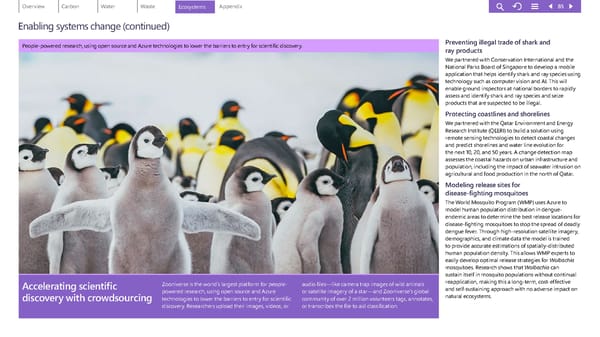Enabling systems change (continued) People-powered research, using open source and Azure technologies to lower the barriers to entry for scientific discovery. Accelerating scientific discovery with crowdsourcing Zooniverse is the world’s largest platform for people - powered research, using open source and Azure technologies to lower the barriers to entry for scientific discovery. Researchers upload their images, videos, or audio files — like camera trap images of wild animals or satellite imagery of a star — and Zooniverse’s global community of over 2 million volunteers tags, annotates, or transcribes the file to aid classification. 85 Preventing illegal trade of shark and ray products We partnered with Conservation International and the National Parks Board of Singapore to develop a mobile application that helps identify shark and ray species using technology such as computer vision and AI. This will enable ground inspectors at national borders to rapidly assess and identify shark and ray species and seize products that are suspected to be illegal. Protecting coastlines and shorelines We partnered with the Qatar Environment and Energy Research Institute (QEERI) to build a solution using remote sensing technologies to detect coastal changes and predict shorelines and water line evolution for the next 10, 20, and 50 years. A change detection map assesses the coastal hazards on urban infrastructure and population, including the impact of seawater intrusion on agricultural and food production in the north of Qatar. Modeling release sites for disease-fighting mosquitoes The World Mosquito Program (WMP) uses Azure to model human population distribution in dengue- endemic areas to determine the best release locations for disease-fighting mosquitoes to stop the spread of deadly dengue fever. Through high-resolution satellite imagery, demographics, and climate data the model is trained to provide accurate estimations of spatially-distributed human population density. This allows WMP experts to easily develop optimal release strategies for Wolbachia mosquitoes. Research shows that Wolbachia can sustain itself in mosquito populations without continual reapplication, making this a long-term, cost-effective and self-sustaining approach with no adverse impact on natural ecosystems.
 Environmental Sustainability Report | Microsoft Page 84 Page 86
Environmental Sustainability Report | Microsoft Page 84 Page 86